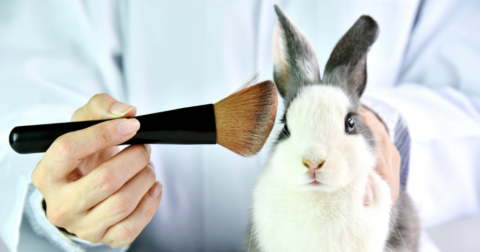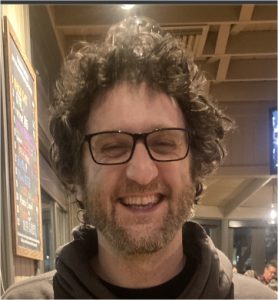Reported
Animal Lab Workers Experience Mental Health Struggles, but Are Rarely Heard From
Health•10 min read
Explainer
More humane and effective techniques abound, but many brands remain stuck in arcane ways.


Words by Seth Millstein
For almost a century, cosmetic companies have tested their products on animals. But it’s an inhumane practice of questionable reliability, and countries around the world are beginning to recognize this. In 2023, Canada, Chile and Brazil all outlawed cosmetic testing on animals, as did the state of Oregon.
These developments notwithstanding, cosmetic testing on animals is still standard practice in the industry. This, even though there are more effective and humane alternatives to cosmetic animal testing out there. So why aren’t all brands using them?
Let’s take a look at what cosmetic animal testing is, why many cosmetic companies still use it — and the more humane paths forward for the industry.
When most people think of cosmetics, they think of nonessential, noninvasive products that people use to improve their appearance. But under U.S. law, “cosmetics” also include products that help you clean your body, like shampoo, soap, toothpaste, shaving cream or deodorant. If you’re applying something non-medicinal to your body, that thing is usually considered a cosmetic product.
However, if an otherwise cosmetic product contains ingredients meant to treat or prevent a disease or ailment — such as acne cream or sunscreen — it may be considered a drug instead of a cosmetic under FDA rules.
The primary reason cosmetic companies test their ingredients and products on animals is to ensure customer safety — and avoid any legal consequences for failing to do so. Although the FDA doesn’t have to approve the ingredients of cosmetics before they’re put on sale (with the sole exception of color additives, oddly), it can take action against cosmetics manufacturers if their products are found to be dangerous or mislabeled once they’re on shelves. Cosmetics companies test their products on animals to avoid this, operating under the assumption that if an ingredient harms an animal, it probably harms a human as well.
Animals used for safety assessments of makeup products and their ingredients are usually small, docile and highly social creatures that are otherwise often kept as pets. These typically include rabbits, guinea pigs, mice and rats. In most cases, these animals are killed after they’re experimented on.
Cosmetics companies test their products on animals in a variety of ways, depending on the cosmetic or the ingredient being tested. Sometimes, they’ll rub a product or ingredient on an animal’s skin to see if there’s an allergic reaction, or to determine to what extent the ingredient is absorbed into the animal’s bloodstream.
Rabbits are often subject to something called the Draize test, which has faced criticism over the years due to both moral and practical concerns. The Draize test involves putting rabbits in full-body restraints, forcibly holding their eyelids open and placing potentially harmful ingredients on their eyeballs to observe the result. This observation period lasts several weeks, during which the rabbit may experience bleeding, cracking, swelling and ulceration in and around their eyes. If the rabbit is blinded or otherwise suffers permanent eye damage as a result of the test, they are killed. If they survive without any permanent damage, they are then used for further tests.
Another especially brutal form of cosmetics testing is the LD50 test, which is meant to determine the precise amount of a substance that is lethal to 50 percent of people who are exposed to it. This involves forcibly exposing a group of animals to the substance in question — for instance, force-feeding chemicals to rats or forcing mice to inhale a certain fragrance — and increasing the dosage until half of them die.
There are two main reasons to oppose cosmetics testing on animals: It causes mass suffering and death for the animals unfortunate enough to be subjected to it, and it isn’t the most reliable way of determining whether or not a product is harmful to humans.
According to the Humane Society, around half a million animals die every year from cosmetics testing. That death toll itself is reason enough to question the morality of the practice, but even that doesn’t capture the full moral cost of testing cosmetics on animals.
For one, as previously mentioned, most of these animals must endure excruciating pain before their deaths. But it’s also worth considering the conditions lab animals are forced to live in when they’re not being tested on. In many cases, they’re confined to cages that are scarcely big enough to move around in, and exposed to bright, unnatural lighting. This is a problem for rabbits, as their eyes are extremely sensitive to light — so much so that in their natural habitats, they spend most of the daytime underground.
In addition to these ethical concerns, there’s a big practical one as well: it’s not clear that these tests are even helpful in accomplishing their stated goal of determining whether a cosmetic ingredient is likely to harm a human. This makes intuitive sense; animals have very different biology than humans, and chemicals have different effects depending on what type of organism they’re interacting with.
The eyes of a rabbit, for example, are radically different from the eyes of a human. They have thinner membranes, more porous surfaces, less efficient tearing systems, higher pain thresholds, larger corneas and a third eyelid — just to name just a few differences. This throws the reliability of the Draize test into question, as the test is premised on rabbit eyes being a valid stand-in for human eyes.
Around 400 animals are used for each carcinogenicity test, while regulations require multiple tests to determine whether an ingredient causes cancer. Yet these tests are only accurate 42 percent of the time, according to Cruelty Free International. Tests on the skin of guinea pigs, meanwhile, only predict human allergic reactions 72 percent of the time.
Many major cosmetics companies still sell products that, in whole or in part, are tested on animals. Those brands include Arm & Hammer, Calvin Klein, Aquafresh, Estée Lauder, Head & Shoulders, L’Oreal, Maybelline, Noxzema, Procter & Gamble and many more.
Luckily, there are plenty of widely available cosmetics companies that don’t test on animals. Dr. Bronner’s, Bare Minerals, e.l.f. Cosmetics and Schmidt’sare but a few of them. (You can find an extensive list of many more brands that don’t test on animals here.)
It’s very important to note, however, that just because a cosmetic product’s packaging says “cruelty-free,” or “we don’t test on animals,” doesn’t necessarily mean it’s so. The phrase “cruelty-free” isn’t legally regulated, so companies are free to use it regardless of how their products were made. “We don’t test on animals” can be misleading for a different reason: Many companies perform no animal testing themselves, but do purchase ingredients from companies that test on animals.
A “cruelty-free” product not tested on animals is also not the same thing as a vegan product. If a cosmetic product still contains animal ingredients, it arguably can’t be fully cruelty-free (but might still be marketed as such). To truly support cruelty-free companies, you can look for products that are labeled both vegan and not tested on animals.
Although no governmental body regulates the labeling of cruelty-free cosmetic products, several organizations have taken it upon themselves to do so. One is the Leaping Bunny Program. Launched by Cruelty Free International in 1996, Leaping Bunny has developed a rigorous set of standards that products must meet in order to earn the organization’s stamp of approval. Once a product meets those standards, it may use the Leaping Bunny logo on its packaging. Several similar organizations have their own standards for certifying cruelty-free cosmetics, including Cruelty-Free Kitty and Ethical Elephant.
One of the most frustrating things about cosmetic testing on animals is that there are already so many more humane alternatives to it. A popular one is in vitro testing, in which cosmetics are tested on reconstructed cells in a dish rather than an animal; a similar process, known as ex vivo testing, involves taking cells from a living creature instead, and is believed to be more accurate than in vitro.
Alternatively, given the countless number of cosmetic products that have already been cleared for human use, cosmetics companies could completely forgo animal testing by only using ingredients that have already been tested and confirmed to be safe for humans.
Laws and regulations surrounding cosmetic testing on animals vary wildly across the world. On one end of the spectrum, you’ve got countries like Chile, Israel and Mexico, all of which have banned the practice entirely; on the other end, you’ve got China, which has historically required cosmetics to be tested on animals before hitting the market (although this has started to change).
As of this writing, 45 countries have passed laws that either outlaw cosmetic testing on animals or prohibit the sale of cosmetics that were tested on animals. That list includes India, Canada, Turkey, Colombia, Australia, South Korea and the entirety of the European Union. Although the U.S. does not have a federal ban on cosmetic testing on animals, 11 states have taken it upon themselves to enact bans.
Although many major cosmetic brands still test their products on animals, there’s reason to be optimistic about the future. In the U.S., a bipartisan coalition of lawmakers introduced the Humane Cosmetics Act, which would ban the practice. It hasn’t yet become law, but it does currently have 206 co-sponsors in the House of Representatives, which is less than 20 votes shy of the majority needed to become law.
In the meantime, certification programs like Leaping Bunny can help ethically-minded consumers vote with their dollars, and ensure that their money doesn’t support animal testing.
Given the more reliable and humane alternatives, there’s no reason we can’t live in a world where no cosmetics are tested on animals — and if global trends are any indicator, that reality is getting closer by the day.
Correction: An earlier version of this post inaccurately stated 400 animals per year tested in carcinogenicity testing, but that figure is per test, not total.